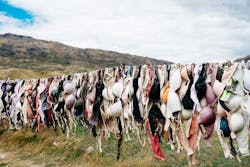Physicians have long recognized that women with denser breasts are at increased risk of invasive breast cancer, heightening the importance of mammography screenings.
A paucity of data, however, established such a risk in women 65 years old and older, and virtually no data existed for women 75 years old and older.
A large study led by a population health scientist at the University of Florida examined data from more than 193,000 women 65 years old and older, including more than 70,000 who were at least 75 years old, and found a positive association between breast density and breast cancer risk.
The paper is published in JAMA Network Open.
Right now, the U.S. Preventive Services Task Force (USPSTF) does not recommend for or against mammography screening after age 75. The task force says evidence to weigh risk versus benefit has been insufficient for a definitive recommendation.
Breast density is a measure of the amount of fibrous or glandular tissue compared with fatty tissue, with less dense breasts containing more fat. Roughly half of women ages 40-74 have dense breasts. The breasts of aging women become less dense over time, although nearly a third of all women 65 years old and older still have dense breasts.
The USPSTF recommends a mammogram every two years for women in the 50-74 age group. American Cancer Society recommendations are slightly different, with annual mammograms suggested for women 45 and older, and then biennially after age 55 for women who are in good health.
Physicians note that not all older women would benefit from screening mammography, especially those with serious medical conditions.
The study analyzed data from the Breast Cancer Surveillance Consortium and specifically examined breast density as a breast cancer risk factor in two groups of women — those ages 65 to 74 and those who are 75 and older. Data were collected from women in New Hampshire, Vermont, North Carolina, the San Francisco area, Washington, New Mexico, and Colorado.
While researchers found that age is the strongest risk factor for breast cancer, women with dense breasts have a higher risk of breast cancer than women with fatty breasts. And the risk increases with increasing breast density. For example, in women 65-74 years old, the team found an increased five-year risk of breast cancer that ranged from 11.3 per 1,000 women in groups with fatty breasts to 23.7 per 1,000 women in groups with dense breasts.

